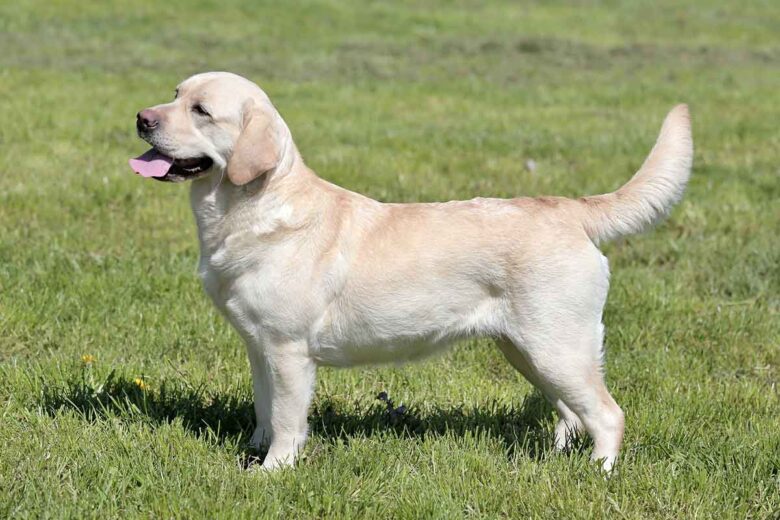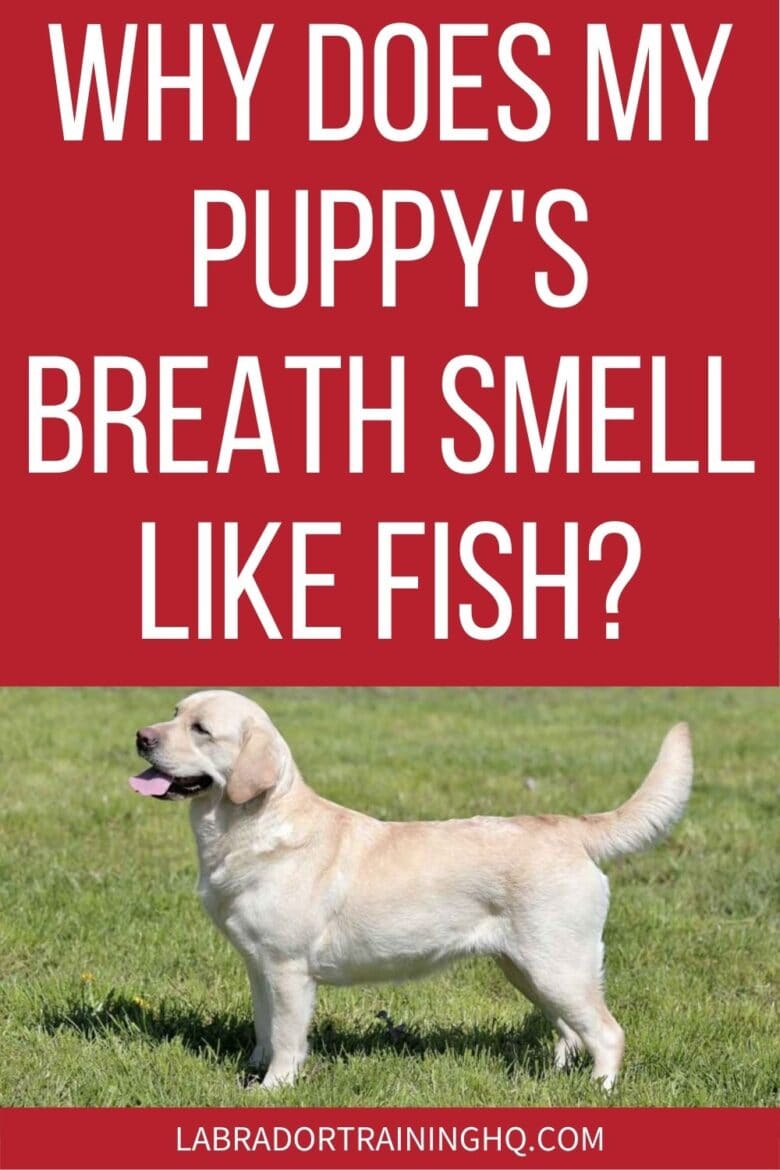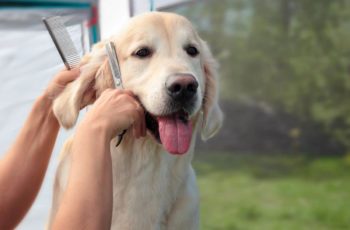This post may contain affiliate links. We may earn money or products from the companies mentioned in this post.
Giving cuddles and kisses to your favorite furry friend is part of the joy of having a dog.
However, sometimes your puppy’s breath smells so bad you seriously think you may be standing in the middle of a fish market.
So, why does puppy breath sometimes smell fishy?
Dog breath is not necessarily ‘nice’ smelling, however it should be bearable.
Seriously bad dog breath, especially if it smells like fish, is a sign there is something wrong in your pup’s body and you should address it as soon as possible.

We’ll start at the top and work our way down your dog’s body to determine the cause of fishy-smelling breath: oral hygiene, gut health, anal gland issues.
So, be forewarned, this article is not for the faint of heart or queasy of stomach!
Along with discussing the signs and symptoms to watch out for, we’ll discuss ways you can address the issues so cuddle time is fresh instead of fishy in the future.
Contents & Quick Navigation
Oral Hygiene
If you notice a fishy smell every time your dog opens its mouth, the most likely cause is periodontal disease.
This condition is relatively easy to treat if caught early and it hasn’t had time to seriously damage your dog’s mouth.
What Is Periodontal Disease?
When your dog eats, particularly soft food or a raw diet that is lacking in fiber and crunchy elements, the food can collect along the gumline.
If your dog is not getting its teeth brushed regularly, this buildup continues to grow and get worse.
This buildup is the perfect breeding ground for bacteria. If the bacteria is allowed to continue to grow, it can inflame the gums and cause gum disease called gingivitis.
If your dog’s mouth is very red and looks swollen, then gingivitis is usually the culprit.
If the plaque along the gumline is allowed to harden over time, it forms calculus, which causes the gums to start separating from the teeth.
This in turn causes the teeth to loosen and allows more space for bacteria to grow.
The rotting, bacterial infection, gingivitis, and calculus all contribute to your puppy’s breath smelling like fish.
Are All Dogs Prone To Periodontal Disease?
Smaller dog breeds are more prone to periodontal disease because their teeth are very close together.
This means the crunchy part of their food is not always able to scrape the plaque away and brushing their teeth can be more of a challenge.
Ways To Treat And Prevent Periodontal Disease
The easiest way to prevent periodontal disease and the onset of fishy breath is to brush your dog’s teeth daily. You need to brush your own teeth at least once a day, so why should your dog be any different?
Use a toothbrush and toothpaste that are safe for dogs and not the human kind, as the latter has additives that can make dogs sick.
You can also put a dental water additive in their water bowl to help fight bacteria and tartar buildup.
Your pup should get its teeth cleaned at its yearly check up by your vet, to get rid of any hard buildup.
Among your pup’s toys, they should have some dental chews, which have ridges and grooves on them that gently clean the teeth as they are chewed on.
You can also use dental treats as a way of rewarding your dog and keeping their breath nice and fresh while at the same time fighting plaque buildup.
Gut Health
If you have determined that your puppy’s teeth and gums are healthy and not the cause of their fishy breath, the next cause to look at is their gut health.
What Causes Gut Health Issues?
If your dog feels like they’re missing something in their diet, they may resort to eating their own or other dog’s waste (poop).
Eating waste will cause your dog’s breath to smell awful and it will upset their internal gut microbiome.
If you find your dog eating waste, also known as coprophagia, then take a close look at the ingredients in their food.
Their food may be lacking in insoluble fiber or the correct protein, have too much wheat or corn in it, or lack prebiotics and probiotics.
How Can I Address Gut Health Issues?
Add a good probiotic supplement that has prebiotics in it too, to their daily food. The probiotics are good bacteria that aid in digestion.
Introducing more probiotics to their diet will help limit the bad bacteria that may be causing the fishy breath.
You can also try out a different brand of dog food with a different protein source in it to see if your dog may have a slight allergy.
If you notice your dog is excessively eating its own or other dog’s waste, you need to implement additional training to prevent them from doing so, as it can be very harmful in addition to being gross.
Anal Gland Issues
If all else fails, look under their tails.
Dogs have anal glands on either side of their anus. When your dog passes waste, these anal glands are stimulated and secrete a smelly substance onto the waste to send messages to other animals.
This is why dogs sniff each other’s anal areas.
If you notice your dog’s waste is very runny or watery, there is a good chance these anal glands are not being stimulated properly and may have become blocked.
This is very uncomfortable and sometimes painful for your dog.
Your dog will try to relieve the discomfort by either ‘butt-scooting’ and leaving a fishy snail trail along the floor, or they will lick their anal area to relieve the pressure.
If they are excessively licking the area, their breath will smell horrifically fishy.
How Do I Fix This Problem?
Their anal glands may need to be expressed, which means a trip to the vet.
If your dog has a runny stomach and this is the cause of the anal gland blockage, then you will need to identify why their stomach is in this state.
Often, dogs have a runny stomach because there is a gut biome imbalance or they have an infection and need a round of antibiotics to help sort them out.
The anal area may also have an infection of its own and your vet will prescribe an antibiotic cream and tablet to help clear it up.
FAQs About Fishy Dog Breath
My dog’s oral hygiene, gut health, and anal health are all fine, so why does their breath still smell fishy?
Your pup may have another underlying condition that is causing the bad breath. Kidney failure and ketoacidosis (often found in diabetic dogs) can cause very unpleasant-smelling breath.
Your vet will need to diagnose these issues with blood and urine tests.
If you suspect a kidney issue, look out for excessive thirst, excessive urination, lethargy, and fainting spells, and get your dog to the vet immediately.
If the bad breath is accompanied by vomit and a yellow tinge to the gums and eyes, then your dog may be experiencing liver disease. An urgent trip to the vet is necessary to avoid further damage to your dog’s body.
My dog is completely healthy but their breath still stinks. Why is that?
A simple answer is that dogs have some nasty eating habits.
Dogs are, by nature, scavengers and will dig through trash, eat decomposing animals they find in the garden, or look for a tasty treat in your cat’s litter box.
If they are eating decomposing, foul-smelling, gross things, then their breath will have a similarly nasty smell to it.
Check around the home to see where your pup may be snacking where they definitely shouldn’t be.
Barking Off: Why Your Puppy’s Breath Smells Like Fish
While dogs will have breath that is not always pleasant for a human’s nose, it should not be so bad that your nose hairs curl and your eyes start streaming.
Puppies should not have breath that smells like fish unless they have just eaten a yummy fishy treat.
There are a number of causes for fishy-smelling dog breath. Starting at the top and the easiest thing to address is their oral hygiene.
Periodontal disease is easily avoided if proper care is provided.
Moving on to not-so-nice causes for fishy breath, an imbalance in your dog’s gut health or an anal gland issue may be causing your dog to eat, lick, and investigate things that are definitely not on your approved dietary list.
To be safe, a quick trip to the vet will help you determine why your dog has fishy breath and determine the best course of treatment for them, so you can go back to cuddles and kisses galore.
Save To Pinterest

Top Picks For Our Dogs
- BEST PUPPY TOY
We Like: Calmeroos Puppy Toy w/ Heartbeat and Heat Packs – Perfect for new puppies. Helps ease anxiety in their new home. - BEST DOG CHEW
We Like: Bones & Chews Bully Sticks – All of our puppies love to bite, nip, and chew. We love using Bully Sticks to help divert these unwanted behaviors. - BEST DOG TREATS
We Like: Crazy Dog Train Me Treats – One of our favorite treats for training our service dog puppies. - BEST FRESH DOG FOOD
We Like: The Farmer’s Dog – A couple months ago we started feeding Raven fresh dog food and she loves it! Get 50% off your first order of The Farmer’s Dog.
For a list of all the supplies we get for our new service dog puppies check out our New Puppy Checklist on the PuppyInTraining.com blog.
Why Does My Puppy’s Breath Smell Like Fish? (Should I Worry?) was last modified: December 17th, 2022 by


